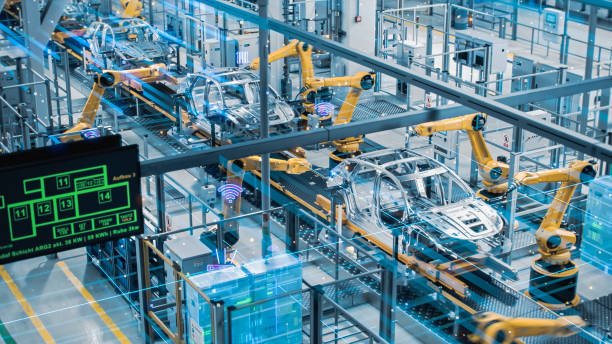Modular Production Systems: Reshaping Industrial Flexibility
Modular production systems are revolutionizing industrial operations, offering unprecedented flexibility and efficiency. This innovative approach to manufacturing combines adaptable equipment modules with advanced control systems, enabling rapid reconfiguration of production lines. As businesses face increasing pressure to respond swiftly to market changes, modular production systems provide a compelling solution for agile manufacturing.

The key components of a modular production system include:
-
Standardized interfaces: Ensuring seamless integration between modules
-
Plug-and-play functionality: Allowing quick setup and reconfiguration
-
Distributed control systems: Enabling independent operation of modules
-
Scalability: Facilitating easy expansion or contraction of production capacity
This modular approach represents a significant departure from traditional, fixed production lines, offering manufacturers the ability to adapt swiftly to changing product requirements or market demands.
Advantages in Operational Flexibility
One of the primary benefits of modular production systems is the unprecedented level of operational flexibility they provide. Traditional manufacturing setups often require extensive downtime and costly retooling when switching between product types or introducing new products. In contrast, modular systems allow for rapid reconfiguration with minimal disruption.
This flexibility translates into several tangible advantages:
-
Reduced time-to-market for new products
-
Ability to handle small batch sizes efficiently
-
Easy integration of new technologies or processes
-
Improved responsiveness to market fluctuations
For instance, an automotive parts manufacturer utilizing a modular production system can swiftly adjust its lines to produce different components as demand shifts, without the need for extensive retooling or production halts.
Cost Efficiency and Resource Optimization
Modular production systems offer significant cost benefits beyond their flexibility advantages. By allowing manufacturers to reconfigure existing equipment rather than investing in entirely new production lines, these systems can substantially reduce capital expenditures.
Additionally, the modular approach facilitates:
-
Improved equipment utilization rates
-
Reduced maintenance costs through easier access to individual modules
-
Lower energy consumption by activating only necessary modules
-
Minimized production downtime during upgrades or repairs
These factors contribute to a more efficient use of resources and can lead to substantial long-term cost savings for manufacturers adopting modular production systems.
Challenges in Implementation
While the benefits of modular production systems are compelling, their implementation is not without challenges. One of the primary hurdles is the initial investment required to transition from traditional fixed production lines to a modular setup. This investment includes not only the physical equipment but also the necessary control systems and staff training.
Other challenges include:
-
Standardization issues: Ensuring compatibility between modules from different suppliers
-
Complexity in system design: Balancing flexibility with operational efficiency
-
Quality control: Maintaining consistent product quality across reconfigurations
-
Workforce adaptation: Training employees to operate and maintain modular systems
Overcoming these challenges requires careful planning, investment in employee skills, and often, collaboration with experienced system integrators or technology providers.
Future Trends and Industry Impact
As modular production systems continue to evolve, several trends are shaping their future development and adoption:
-
Integration with Industry 4.0 technologies: Incorporating IoT sensors, AI-driven analytics, and advanced robotics to enhance module capabilities and system intelligence.
-
Increased standardization: Development of industry-wide standards for module interfaces and communication protocols to facilitate broader adoption and interoperability.
-
Sustainability focus: Designing modules with energy efficiency and recyclability in mind, aligning with growing environmental concerns.
-
Expansion beyond manufacturing: Adaptation of modular principles to other industries, such as food processing and pharmaceutical production.
These trends suggest that modular production systems will play an increasingly significant role in shaping the future of industrial operations, driving greater efficiency, flexibility, and sustainability across various sectors.
Key Strategies for Implementing Modular Production Systems
-
Conduct a thorough assessment of current production processes to identify areas suitable for modularization
-
Start with pilot projects to test and refine modular concepts before full-scale implementation
-
Invest in comprehensive training programs to ensure workforce readiness
-
Collaborate with suppliers and technology partners to develop standardized module interfaces
-
Implement robust data collection and analysis systems to optimize module performance and configurations
-
Regularly review and update modular strategies to align with evolving business needs and technological advancements
In conclusion, modular production systems represent a paradigm shift in manufacturing, offering unparalleled flexibility and efficiency. As businesses navigate an increasingly dynamic market landscape, the ability to swiftly adapt production processes becomes crucial. By embracing modular approaches, manufacturers can position themselves at the forefront of industrial innovation, ready to meet the challenges and opportunities of tomorrow’s market demands.





